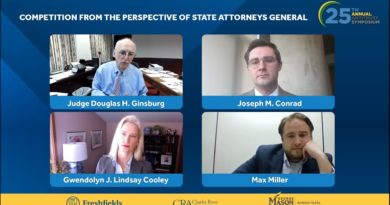New DOJ Health Care Task Force Portends Continued Aggressive Antitrust Enforcement
The health care industry has been a particular focus of antitrust concern in recent years, including recent policy initiatives, private equity warnings, and enforcement actions from both the Department of Justice (DOJ) and Federal Trade Commission (FTC). The new Task Force on Health Care Monopolies and Collusion (HCMC), announced this month by the DOJ, is the latest example of antitrust scrutiny on the industry.
Much like the DOJ Antitrust Division’s other recent task force, the Procurement Collusion Strike Force (PCSF), the HCMC will draw together government enforcement officials to share expertise and coordinate investigations and actions. However, reflecting the agencies’ attention to the complex and evolving nature of the health care industry, the HCMC will also include policy and industry experts, economists, and data scientists, among others. The DOJ’s announcement indicated a focus on vertical consolidation of payors, providers, and data. Executives, investors, and counsel should expect increased criminal and civil antitrust enforcement activity targeting all facets of the health care industry.
Enforcement
If the PCSF is any example, the HCMC will likely mean a further uptick in antitrust investigations and enforcement actions in the health care industry, which have already been at a high-water mark. By way of comparison, in its first five years, the DOJ touts that the PCSF has already initiated more than 100 investigations and secured more than 50 pleas and convictions.
Notably, the HCMC announcement included the launch of a new webpage on the Antitrust Divisions’ site geared towards public reporting. The page contains layman explanations of potential antitrust harms and prominently features both a hotline and complaint portal. The results of this attempt to encourage consumers to provide information remains to be seen as many of the envisioned violations would require insider knowledge or assistance of counsel to understand or even detect.
Policy
In addition to increased enforcement efforts, the Task Force will guide the Antitrust Division’s policy and overall strategy, as well as facilitate “policy advocacy.” The inclusion of a policy focus—differing from the goals of PCSF—is not surprising given the agencies’ inclination for more aggressive antitrust policy, and actions such as the Department’s withdrawal of key healthcare policy statements last year. Though policy effects could take longer to develop, they may shape the future of the industry.
Why This Matters
While the DOJ and FTC continue to aggressively review healthcare transactions under the new Merger Guidelines, scrutiny will likely increase on business practices that could provoke civil and criminal liability under the Sherman and Clayton Acts. Currently commonplace practices and evolving methods of coordination in the health care and health care tech industries may invite a more vigorous examination.





